 Petzlover
Petzlover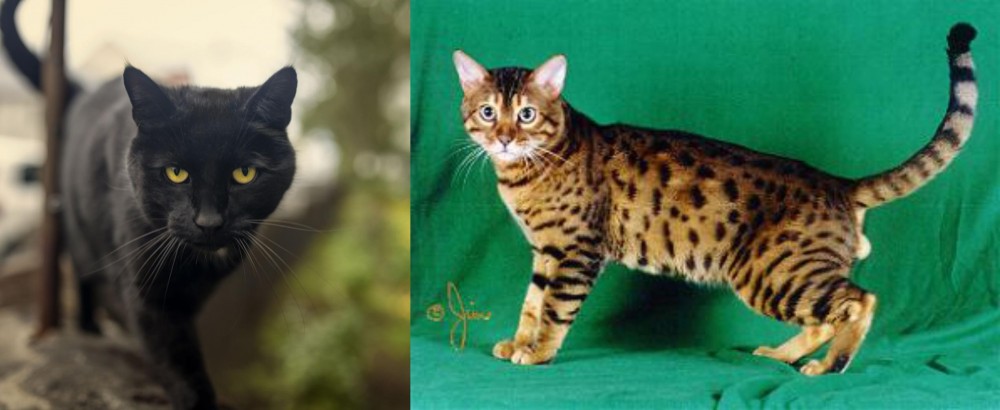 Both Bombay and Bristol are originated from United States. Both Bombay and Bristol are having almost same weight. Both Bombay and Bristol has same life span. Both Bombay and Bristol has same litter size. Both Bombay and Bristol requires Low Maintenance.
Both Bombay and Bristol are originated from United States. Both Bombay and Bristol are having almost same weight. Both Bombay and Bristol has same life span. Both Bombay and Bristol has same litter size. Both Bombay and Bristol requires Low Maintenance.
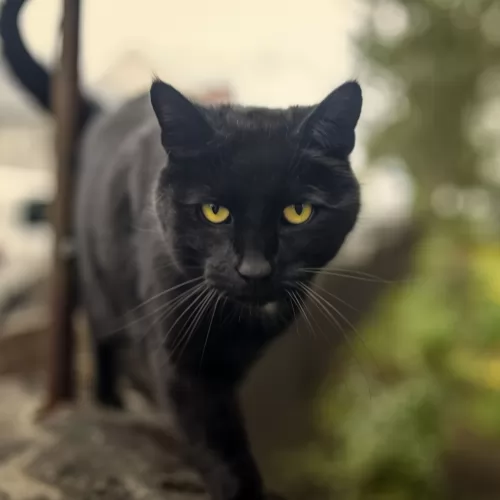 The Bombay cat was developed by breeding black American Shorthair cats and sable Burmese cats to bring about a sleek panther-like cat.
The Bombay cat was developed by breeding black American Shorthair cats and sable Burmese cats to bring about a sleek panther-like cat.
Cats of the Asian group are given the name Bombay cats. It is also known as the Black Mamba or mini-panther. In fact the Bombay cat was developed by Nikki Horner, a breeder from Kentucky, USA.
In 1976 the Bombay cat was successfully bred and was recognized and registered by the Cat Fanciers' Association in 1970 and also the International Cat Association.
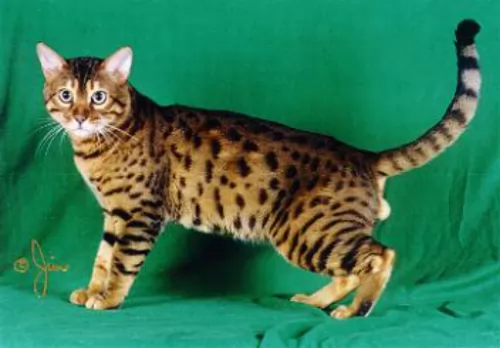 The Bristol cat hails from Texas and was developed during the 1980s, using a south American wild cat and domestic cats.
The Bristol cat hails from Texas and was developed during the 1980s, using a south American wild cat and domestic cats.
The Bristol cat isn’t well-known and in fact, its origins are shrouded in mystery.
The cat was recognized and admitted into the TICA (The International Cat Association. It is looked upon as a hybrid breed or a designer cat.
Nobody seems to know when the first Bristol cat was even bred. Because of its exotic nature, it is believed to be a cross between the American Shorthair and the margay or similar breed.
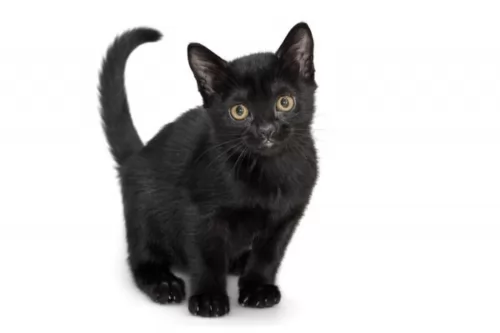 As a short-haired cat, the Bombay is related to the Burmese cat. It’s a medium-sized cat, muscular, lithe, and agile – like a black panther.
As a short-haired cat, the Bombay is related to the Burmese cat. It’s a medium-sized cat, muscular, lithe, and agile – like a black panther.
The cat weighs anything between 3 to 7kg. It is a stocky, compact cat with a round head and ears that are fairly rounded at the tips. The coat of the Bombay is short and glossy. In fact, it is the pitch-black short, close-lying shiny coat of the Bombay cat that makes it so distinctive and that with its green or copper-colored eyes. The cat’s nose as well as the pads of their paws, are also black
Bombay cats are very social, getting on well with all their human family members. They’re affectionate and like to demand attention from their humans.
They’re typical cats in many ways and are curious and alert. You wouldn’t describe the Bombay as an independent cat breed, although the older ones do become more independent as they mature but they are cats that dislike being left alone for long periods of time.
They are however adaptable to different lifestyles and can easily learn new tricks. They’re intelligent cats and will need toys that make him think. He always loves to play with the toys close to his human owner and has quite a loud meow and purr to voice his feelings
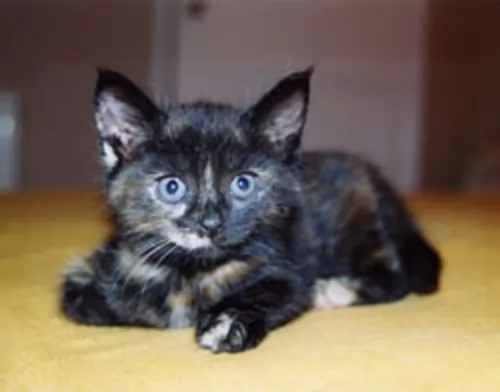 Bristol cats are medium-sized and muscular, powerful cats. They are much like Bengal cats. They have a smokey charcoal appearance while others have quite a bit of white on them.
Bristol cats are medium-sized and muscular, powerful cats. They are much like Bengal cats. They have a smokey charcoal appearance while others have quite a bit of white on them.
They also have rosettes and small rounded ears. The origins of the Bristol breed are uncertain but it seems a multi-colored cat was adopted by a United States Army captain in Australia.
The cat was so adored it was brought back when they returned to the United States. The cat was already pregnant and she gave birth to 2 kittens. The coats are shiny and short-haired with spots and lines of fawn, grey and brown mostly with the eyes being green.
The Bristol cat has a very pleasing disposition – being amicable, playful, and loving. They’re intelligent cats too but they need to spend time in solitude as well.
They definitely don’t respond and bond to everyone in the human family but tend to respond to only one person.
These Bristol cats are cunning and self-confident and because of their wild side, they will need a large area to roam. This is definitely not a cat for city life.
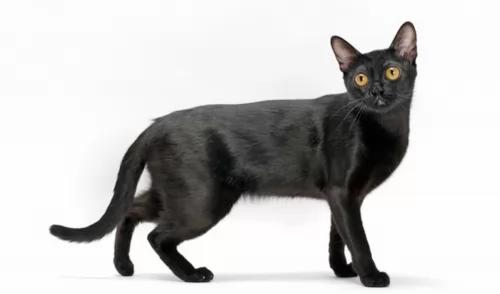 These sleek panther-like cats are a perfect choice if you want a cat that loves its human family.
These sleek panther-like cats are a perfect choice if you want a cat that loves its human family.
Every cat has got their peculiarities and these Bombay cats like heat – you’ll always find them curled up close to the fire or heaters. On a sunny day they’ll want to be outside soaking up the warmth.
Provide your Bombay with all the things he loves and he is guaranteed to make you the most awesome feline companion.
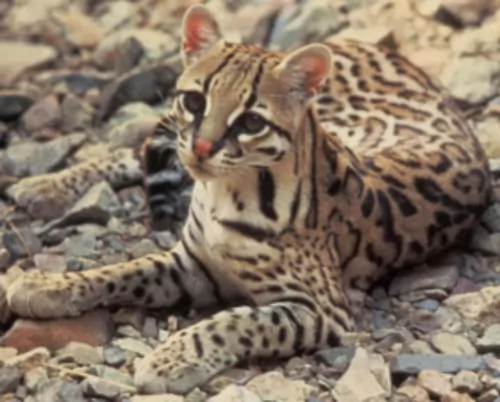 The Bristol cat is beautiful all right, but once again humans should just leave wild cats alone in the bush.
The Bristol cat is beautiful all right, but once again humans should just leave wild cats alone in the bush.
Mixing them with domestic cats doesn’t work in the long run, and many of these cats land up in shelters because of unruly behavior. The Bristol cat is part wild and it doesn’t seem to have a future although there isn’ enough information online to really know what its future is.
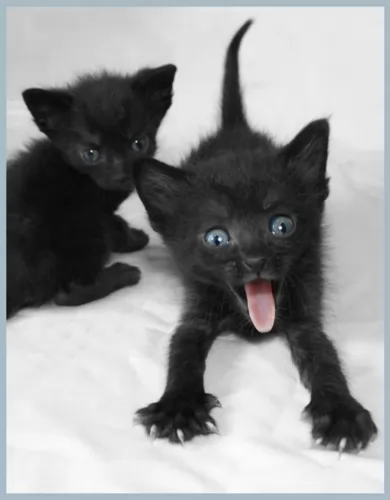 With good care these amazing cats can live to be between 15 and 20 years of age. Your Bombay, just like with other pets, can have any one of the health problems that cats are known for.
With good care these amazing cats can live to be between 15 and 20 years of age. Your Bombay, just like with other pets, can have any one of the health problems that cats are known for.
One of these diseases is craniofacial defect where there is a deformity of the head. Kittens with this deformity are always euthanized.
Vomiting is a sign that all is not well with your cat. Vomiting is actually a common problem with cats and is indicative of a number of causes. It could mean your cat has eaten something inedible, it could mean an infection or even a urinary tract problem.
Remember that ongoing vomiting can lead to dehydration so if your cat continues you must get him to the vet as soon as possible.
Feline Lower Urinary Tract Disease for instance can affect both your male or female cat. There are a number of causes of which stress and being overweight are just two.
You’ll notice your cat battling to urinate, blood in the urine, lack of appetite, restless and licking around the urinary area because of pain. Certainly, this is one reason you want to get your beloved cat to the vet.
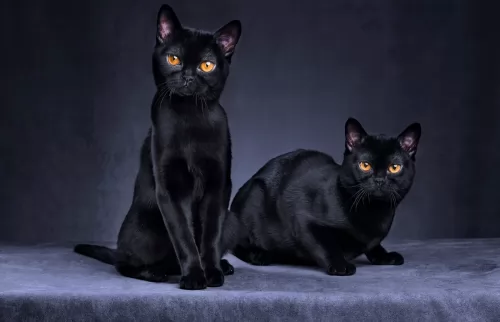 The Bombay isn’t a heavy shedder and requires very little grooming.
The Bombay isn’t a heavy shedder and requires very little grooming.
Provide your Bombay with the right kind of nutrition so that it has every chance to be strong and healthy. Cats are carnivores and you want to be sure that he gets the best food. Make sure that he gets home-made or commercially manufactured cat food that is high in meat protein. Do research or check with your vet to make sure he is being fed the best food there is for his age and activity levels.
Your Bombay requires a constant source of fresh, cool water night and day.
Check inside his mouth from time to time to ensure there are no rotting teeth causing him pain and discomfort. Also, check inside the ears ad make sure they aren’t red which could indicate an infection.
Always get your pet to the vet immediately you suspect that something is wrong.
Keep your cat’s litter box spotlessly clean.
Neuter or spay your Bombay cat to prevent unwanted kittens.Spaying and neuterings as some very beneficial health advantages for your furry friend as well.
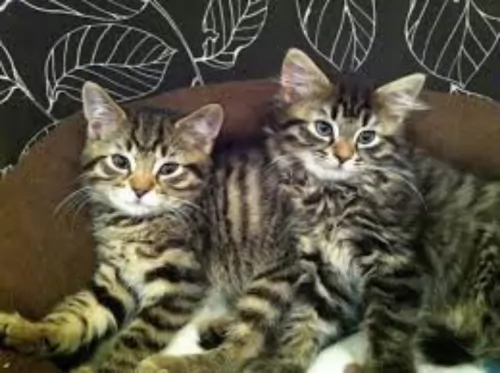 The diet of a cat such as the Bristol will include small rodents, however once domesticated, these cats will need a diet high in protein. The cat is a carnivore and to be healthy it will require high-quality premium commercial cat food that is appropriate for the age of your cat and his health status.
The diet of a cat such as the Bristol will include small rodents, however once domesticated, these cats will need a diet high in protein. The cat is a carnivore and to be healthy it will require high-quality premium commercial cat food that is appropriate for the age of your cat and his health status.
The best cat food has taurine in it, an essential protein that cats can only obtain through quality food. Your adult Bristol cat may prefer eating several smaller meals and this is actually a good idea as smaller frequent meals help towards greater urinary tract health.
If you want a healthy cat, you have to be diligent with providing such a cat with good food that is high in protein. If you aren’t sure, your veterinarian will be able to advise you on what to feed your new cat or kitten.
Factors such as age, size, activity levels, and health make a difference to what you feed your cat, how much and how frequently.
Get into a habit of reading and understanding the labels on the cat food packaging. Certainly, every cat requires taurine, an essential amino acid. You will also need to ensure fresh, cool water day and night.
Always take your pet to the veterinarian if he is lethargic ad disinterested in his food.
Most cats are clean, but you should brush or comb your Bristol cat regularly as the brushing helps keep your cat's coat shiny and also reduces the amount of hair during shedding.
Provide your Bristol cat with a dry, warm sleeping area and keep the bedding clean.
Your Bristol cat needs to wear a safety collar and an ID tag. These ID tags or an implanted microchip can help ensure that your Bristol cat is returned if he becomes lost.
Cats scratch, and cutting your cat’s nails will keep the nails blunt. Nonetheless, to prevent your furniture from being scratched, provide your cat with a strong scratching post covered with a rough material such as sisal or tree bark.
Bristol cats are independent and they don’t require any kind of special care. Certainly, they require large areas for their active lifestyle as well as a shallow pool for swimming.